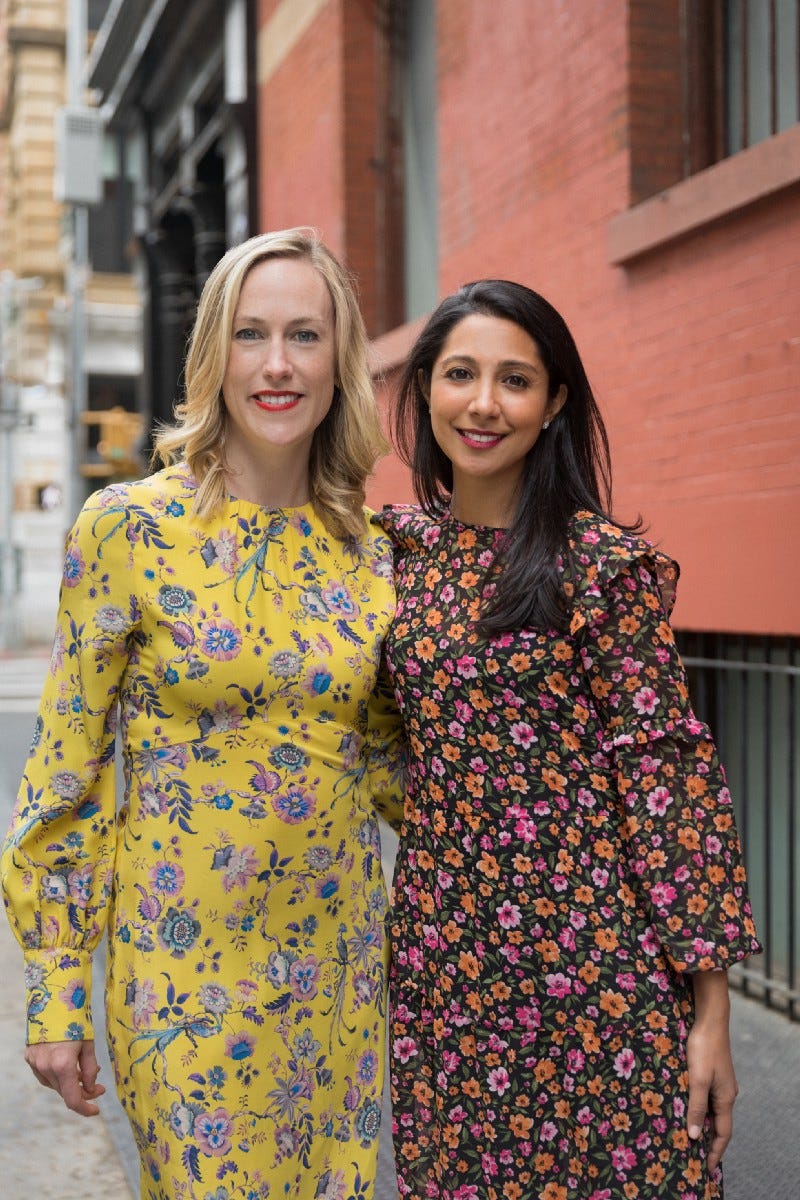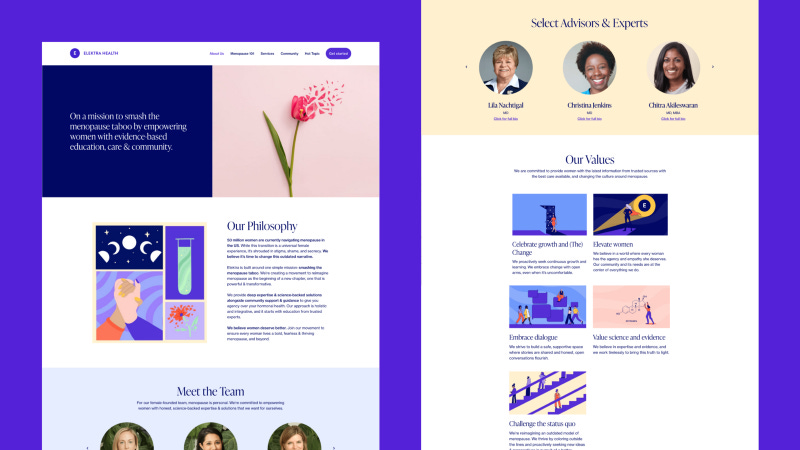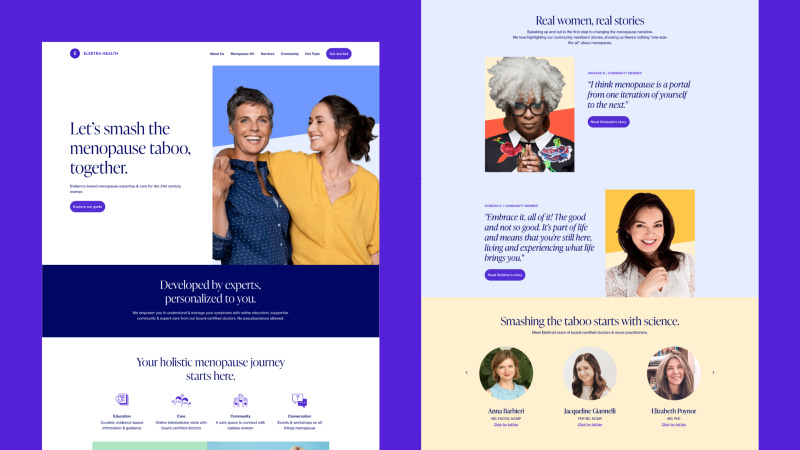The Future of Women’s Health Starts With Smashing Taboos
According to Elektra Health co-founder Alessandra Henderson, menopause is poised to have many multi-billion dollar businesses. Not only are…
According to Elektra Health co-founder Alessandra Henderson, menopause is poised to have many multi-billion dollar businesses. Not only are there 34 symptoms in need of new products and solutions, but the category has been historically underlooked and underserved. But that’s changing: not only are Gen X women digitally savvy consumers, but they also have high discretionary spend and are actively speaking up and out about their health. Today, we’re just starting to scratch the surface of the huge opportunity for companies that improve livelihoods and outcomes for peri- and menopausal women.
50 million women are currently navigating menopause in the US. Sadly, 75% of women who actively seek help for their menopause symptoms do not receive treatment from their doctor. That leaves millions of women needlessly suffering. Elektra’s platform offers them telemedicine care, evidence-based education, community, and events, and is on a mission to bring the outdated and fragmented menopause space into the 21st century in partnership with world-renowned physicians.
In honor of Menopause Awareness Month, we sat down with Alessandra to talk about empowering women through community, why women have historically been so underserved during menopause, and how her own hormonal health journey inspired her to build Elektra.
What inspired you to start Elektra?
Elektra was inspired by a personal health journey of my own that really exposed me to the incredibly fragmented and, unfortunately, incredibly broken healthcare system.
Through that process, I became obsessed with hormonal health. I had frozen my eggs and the hormones from egg freezing impacted my eyesight. I had no idea that a patch by your ovaries could impact your vision and the way you see in the world. I’ve since learned that women have anywhere between 100+ estrogen receptors all over our bodies, and when we talk about hormonal health, it impacts everything from your brain, to your heart, to your gut, to your eyesight.
I’m really excited to build a brand that smashes taboos and unlocks information for a critical point in a woman’s hormonal health journey. I teamed up with my co-founder, Jannine, who has a background in health tech and building equitable digital health solutions, and our founding physician Dr. Anna Barbieri, a double-board certified OB/GYN on staff at Mt. Sinai (also certified by the North American Menopause Society). We also work with an incredible group of advisors, including several past presidents of the North American Menopause Society — the top medical organization in the space. Making sure that we built with evidence-based information and clinical expertise from day one was incredibly important to us.
There are so many shocking statistics about menopause. Even in the medical community, less than 20% of OBGYN residency programs educate doctors on menopause. How did we get here and how is Elektra filling the gap?
There are many reasons why women’s health has been so undervalued in the medical community, with menopause being especially ignored.
First, women’s health broadly is wildly under-researched. For example, from 1977–1993, women were excluded from clinical drug trials. That means 17 years of lost data on how many of the common drugs we use today and their dosing impact women. As a result, women are at greater risk for adverse side effects.
Secondly, looking at areas that are completely focused on women’s health, there has historically been an emphasis on women during their reproductive years. We even see this during pregnancy — after going through their nine-month pregnancy journey, women only get one follow-up visit, and then all the attention gets put on the baby.
After that, we often hear from women who share that they are ignored and feel invisible once they hit perimenopause and menopause. There’s a systemic ageism in not valuing a woman’s voice after a certain age, which is unfortunately baked into the medical community at large.
Lastly, in the US specifically, we are very procedures-based. The entire financial system of medicine is built around procedures: providers make their money from operations such as hysterectomies (one-third of all women will undergo this procedure by age 50) rather than really spending time with a patient and understanding what is going on. Menopause care is very consultative — it requires a lot of talking, listening, and gathering data. Unfortunately, the healthcare system at large does not reward that financially. 75% of women who actively seek care for menopause leave with no treatment at all.
It’s also important to recognize that menopause is not all about age. There are women in their 20s and 30s who experience menopause either through surgical menopause (e.g. Lena Dunham’s hysterectomy for endometriosis put her into menopause), premature menopause (1% of women go into menopause before age 40), or the thousands of women who go into menopause as a result of cancer treatment. We hear from so many of these women who receive treatment from their oncologist who say that they hear “oh, and by the way, you’ll go into menopause” as they are shoved out the door with no kind of support.
That is a really big underserved population of women who have no medical support. For these women and the 6,000 women who enter menopause every day in the US, Elektra is stepping in to fill the gap.

Community is a core pillar of Elektra’s offering. How are you building an engaged community of women, and why was that an important part of your strategy from day one?
Elektra started with community. Pre-COVID, we hosted Elektra salons in community members’ homes, bringing experts out of the exam room and into a safer space for women to ask questions. We found that when one woman had a question, a majority of the women in that space had the same question, but were too embarrassed to ask. We heard “is this normal?” all the time. One woman would almost always ask about painful sex or libido, and every woman in the room would nod their head. More often than not, some women will start crying when they realize that they’re not alone, and that there are solutions to help them.
We’ve tried to take that spirit into everything we do. Today, that manifests on our platform in a private community where women can ask questions with a group of peers, moderated by an expert who can respond with evidence-based expertise.
We offer weekly virtual sessions — we call them Elektra Circles — where women can come together to discuss topics such as sex, anxiety, navigating menopause with a partner, and more. Again, these are facilitated by experts who can answer the tough questions, while allowing women to speak up and out. One favorite session, a woman shared that she “had goosebumps” listening to the women share since they were sharing the same concerns & questions she had, but had felt so alone with. That kind of connection is incredibly powerful above and beyond the medical expertise we provide.
Menopause is often framed as a scary, lonely experience, yet you are building a brand that is focused on empowerment and positivity. How are you thinking about broadening the narratives around menopause?
Menopause can be really hard to talk about. If you look at the list of 34 symptoms, you wouldn’t wish them on anybody. We recognize how difficult it can be, but there is opportunity on the other side — any time of change allows you to reflect, take stock, and figure out who you want to be in the next chapter.
At our core, our brand is about educating and empowering women. We use community stories from real women to help focus on the positives and encourage our community to reframe this period of their life. Notably, there are a few themes we hear regularly from women — from not having to deal with periods anymore, to experiencing a burst of creativity, to finally investing in themselves. One common phrase is, “Entering into menopause has allowed me to step into who I am, and to finally put myself first.”
Our platform exists to give women agency: over their health, their lives, and their story. Historically, women have been expected to just grit their teeth and bear menopause in silence. Thankfully that’s changing, and if there is one thing I want women to know, it’s that there are solutions.
As you go to market, what are your early findings on what works best for your target audience?
Our demographic is Gen X, and we’ve taken their habits into consideration as we build our product. They are incredibly tech-savvy, but definitely lean desktop over mobile. They’re also much more email-loyal than other generations, so we’ve leaned into referral and word-of-mouth. We’ve seen referral rates of up to 40% for some of our programs.
They have a real appetite for expertise and are demanding better solutions, so we make sure to put our expertise front-and-center.
We’re very strategic in how we think about growth and marketing, because it can be harder for a menopausal woman to share her personal story on Instagram, compared to a Gen Z woman who is standing up louder and prouder about their hormonal health experience.
You recently raised a $3.75M Seed round. What are your key priorities for Elektra now that you’ve finished the raise?
Following the raise, we’re focused on building an incredible team (we’re hiring!), and investing in our digital platform. We’re excited to expand our proprietary symptom-based programs, and of course continue to invest in community support offerings.
We’re starting to see more people investing and building in the menopause market, which is projected at $600B. Where do you think this space will be 10 years from now? What are you most excited about?
We’re really excited to see a lot more entrants coming into the space. Menopause is a huge market and there are going to be many multi-billion dollar businesses in it. You just have to look at the fertility market to know that the same will be true of menopause.
I’m really hoping that the healthcare community — both payers and providers — are going to step up efforts around supporting women throughout their menopausal journey.
Culturally, I think we’re going to be in a place where a woman feels more comfortable not only among her friends, but in the workplace, with her partner, and with her children. We recognize that employers play a really big role in supporting employees throughout their healthcare journey, so we’re excited about seeing them offer more support for women at this stage.
Who inspires you?
My dream team are Michelle Obama, Jane Fonda, and Heather Hartnett. Women that speak up and out and aren’t afraid to change the conversation.
There’s also a large group of female entrepreneurs who I feel lucky to count as friends and collaborators. It’s the female founders who are making waves in healthcare and represent who I want to be when I grow up, especially those who are mothers, activists, thought leaders, and writers on top of being startup founders and CEOs.
Interested in joining the team? Elektra is hiring across product, marketing, and customer ops. Explore open roles here.



